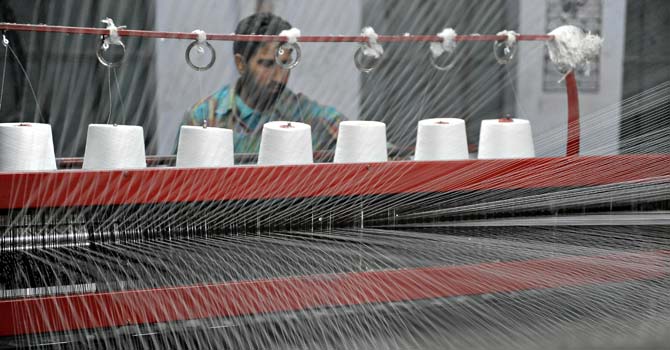The move pushes effective duty on the import of these materials to 15% as these items are already subject to a 5% normal customs duty. The government has also decided to lower interest rates on export refinancing and capital investment schemes for the export sector.
The decision to impose a 10% regulatory duty, which will take effect from November 1, has been taken on the demand of the All Pakistan Textile Mills Association (Aptma), Finance Minister Ishaq Dar said on Saturday. He was announcing the outcome of daylong talks with Aptma and other representative associations of the textile industry.
The textile industry demanded a comprehensive textiles relief package, as the industry has suffered both on domestic and external fronts due to import of cheap raw material and falling commodity prices.
Rising cost of doing business was another reason making the Pakistani industry less competitive than that of India and Bangladesh. Despite duty-free access to European markets, the country’s textile exports remained flat at $2.2 billion during the first two months (July-August) of the current fiscal year, according to the Pakistan Bureau of Statistics.
Although Dar partially accepted the textile industry’s demands, many issues related to un-competitiveness of the exports remained unresolved.
Representatives of the value-added sector were not happy with the government’s decision of imposing regulatory duties, as they were fully exploiting the local industries to sell them raw material at rates equivalent to Indian yarn rates.
Dar said the value-added sector can also benefit as the imports made under the duty and tax remission for export (DTRE) system will be exempted from the regulatory duty.
He said the government has also decided that the interest rate on the Export Refinancing Facility (ERFF) will be reduced by 1% to 3.5% to reduce cost of doing business. The minister added that the interest rate of the Long Term Finance Facility (LTFF) has also been reduced from 6% to 5%. The government also accepted APTMA’s demand and declared ginning and spinning sectors eligible for the LTFF scheme.
Dar also announced that committees comprising representatives from the industry and FBR will be constituted in each Regional Tax Office (RTO) to resolve the issue of pending sales tax refunds. He said the FBR has paid Rs22 billion refunds to the exporters. He also announced that new measures will be taken for prevention of smuggling.
The government has addressed the most burning issue the textile industry has been facing in the shape of cheap raw materials from India, Aptma Punjab Chairman Aamir Fayaz said after the talks.
According to Aptma, cotton imports from India are increasing at the rate of 30% annually. The industry claimed that growing Indian imports were causing several fine count yarn production facilities in the country to shut down.
In order to resolve the remaining issues, the government and Aptma will sit again after Prime Minister Nawaz Sharif’s visit to the United States, said Tariq Saud, the Aptma chairman. He said the issues related to electricity prices and zero rating of sales tax remained unresolved.
Aptma claims exporters cannot survive without an effective zero rating regime. The government has slapped 5% tax on the textile supply chain and the exporters’ refunds remains stuck for years, forcing them to borrow money from banks to meet their capital requirements, according to the Aptma officials. The high cost of electricity and gas tariffs was also rendering exporters uncompetitive in the global market.



